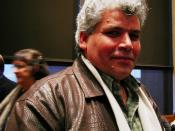Public opinion polls reveal that racial profiling is a concern to a clear majority of Americans. A recent Gallup poll found that 81 percent of Americans thought racial profiling to be wrong and that 59 percent felt that racial profiling was widespread (Ludwig, 2003). The poll also revealed the expected differences between the perceptions of Whites and African-Americans, a solid majority of White (56 percent), and more than three out of four African-Americans (77 percent) survey respondents indicated that they believed the practice was widespread. Even President George W. Bush has weighed in on the subject. In a 2001 address to a Joint Session of Congress, Bush said: "Racial profiling is wrong, and we will end it in America. In so doing, we will not hinder the work of our Nation's brave police officers. They protect us every day, often at great risk. But by stopping the abuses of a few, we will add to the public confidence our police officers earn and deserve" (Bush, 2001).
Chief Russ Leach of the Riverside California Police Department commented that "The practice of racial profiling has no place in law enforcement. It is an activity that undermines the public trust vital for an effective community policing organization. Police must be perceived as both providers of public safety and deferential to the civil liberties of those that they have sworn to protect and serve. While the majority of police officers serve their communities in a professional and ethical manner, the debate over the reality of racial profiling as a practice in law enforcement is loudest on the side of its existence on a national level" (Leach, 2006).
It is easy to see from reviewing these polls and quotes that many people believe that racial profiling exists and is practiced by some law enforcement officers.



Very well structured
Anytime an essay is interesting in subject it catches attention for others to read. Good use of references and cold har facts.
2 out of 2 people found this comment useful.